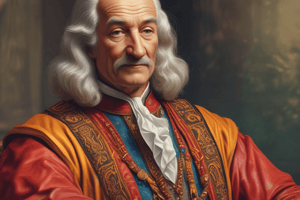Podcast
Questions and Answers
What were some of the major historical events that occurred during the lifetimes of Thomas Hobbes and John Locke?
What were some of the major historical events that occurred during the lifetimes of Thomas Hobbes and John Locke?
The English Civil War, the Interregnum and Glorious Revolution, and the Restoration.
How did the personal life experiences of Hobbes and Locke influence their political views?
How did the personal life experiences of Hobbes and Locke influence their political views?
Both men experienced the instability of social institutions and witnessed the ease with which a nation may plunge into violence. They came from families of modest means and studied at Oxford University.
What is one of Thomas Hobbes' significant works?
What is one of Thomas Hobbes' significant works?
Leviathan.
What did Hobbes believe was the ideal political system?
What did Hobbes believe was the ideal political system?
According to Hobbes, why did humans need a king?
According to Hobbes, why did humans need a king?
What did Hobbes believe about human nature and the state of nature?
What did Hobbes believe about human nature and the state of nature?
According to Locke, what is the purpose of government?
According to Locke, what is the purpose of government?
What is the role of government in Locke's view?
What is the role of government in Locke's view?
What is the difference between Hobbes and Locke's views on the role of government?
What is the difference between Hobbes and Locke's views on the role of government?
Who strongly supported the Glorious Revolution of 1688?
Who strongly supported the Glorious Revolution of 1688?
Flashcards are hidden until you start studying
Study Notes
Hobbes vs. Locke
- Both Thomas Hobbes and John Locke lived through the English Civil War, the Interregnum, and the Glorious Revolution, and their personal life experiences impacted their political views.
- Despite their similarities, they had different views on human nature and the best form of government.
Thomas Hobbes
- Born in 1588, the son of an Anglican vicar, and studied at Oxford University.
- Worked with William Cavendish, who served as King Charles I's chief financier, and tutored the young prince Charles II.
- Fled to Europe during the Interregnum period due to his royalist views.
- Wrote philosophical and political works, including Leviathan (1651), which presented his ideas on the state of nature, human nature, and the power of the monarchy.
Absolutism
- Believed in absolute monarchy as an ideal political system, where the monarch holds complete power and citizens have no authority to invest or take away power.
- Argued that human beings need a king to make decisions, create and enforce laws, and ensure their well-being.
State of Nature
- Believed that in the state of nature, life is solitary, "nasty, brutish, and short" due to human nature being foolish, selfish, violent, and pleasure-seeking.
- Argued that the state of nature leads to barbarity and chaos.
Social Contract
- Believed that the social contract enables humans to escape the brutality of the state of nature by giving up certain liberties in exchange for the protections of the king and civil society.
- Argued that the absolute monarchy is the ideal system to fulfill the social contract.
Quotes
- "It is not wisdom but Authority that makes a law."
- "The condition of man... is a condition of war of everyone against everyone."
- "In the state of nature, profit is the measure of right."
John Locke
- Born in 1632, the son of a Puritan family, and studied at Oxford University.
- Supported the Parliamentarian side and was inspired by the events of the Glorious Revolution of 1688-89.
- Argued that all humans have three fundamental rights: life, liberty, and property, which come from God and cannot be taken away by an absolute monarch.
State of Nature
- Believed that human life in the state of nature is characterized by reason, equality, and justice.
- Argued that humans have the capacity for reason and a love for peace and justice.
Social Contract
- Believed that an ideal form of government allows humans to exercise their reason and liberty to the fullest.
- Argued that humans enter into a social contract to achieve justice and equality, and citizens give a small measure of authority to a leader who resolves disputes, enforces the rule of law, and ensures orderly operation of society.
Quotes
- "Government has no other end but the preservation of property."
- "All mankind... being all equal and independent, no one ought to harm another in his life, health, liberty, or possessions."
- "Every man has a property in his own person. This nobody has a right to, but himself."
- "All wealth is the product of labor."
Differences between Hobbes and Locke
- Hobbes supported absolute monarchy, while Locke did not.
- Hobbes believed the state of nature is a state of war, while Locke believed it is a state of reason and equality.
- Hobbes believed the role of government is to protect humans from their base nature, while Locke believed it is to protect individual rights.
Similarities between Hobbes and Locke
- Both grew up in modest households and studied at Oxford University.
- Both lived through the turbulence of the English Civil War.
- Both were exiled to Europe for a time for their political views.
- Both earned widespread acclaim for their philosophical and political writings.
Influences on Hobbes and Locke
- Hobbes was influenced by Thucydides' exploration of civil unrest and instability.
- Locke was influenced by Hobbes' ideas on the social contract and human nature.
- Both men influenced later writers, such as Jean Jacques Rousseau.
Studying That Suits You
Use AI to generate personalized quizzes and flashcards to suit your learning preferences.




